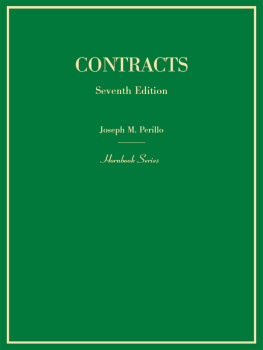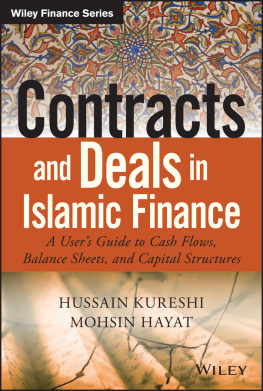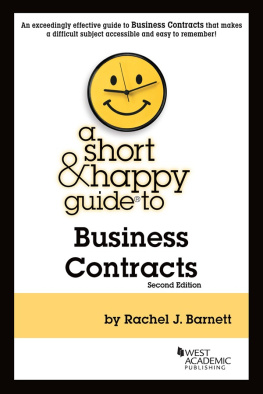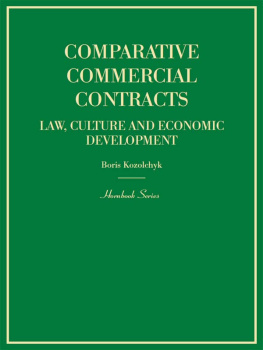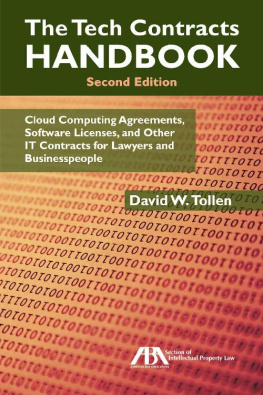Landmarks
Page list

WEST ACADEMIC PUBLISHINGS
LAW SCHOOL ADVISORY BOARD
_________
JESSE H. CHOPER
Professor of Law and Dean Emeritus,
University of California, Berkeley
JOSHUA DRESSLER
Professor of Law, Michael E. Moritz College of Law,
The Ohio State University
YALE KAMISAR
Professor of Law Emeritus, University of San Diego
Professor of Law Emeritus, University of Michigan
MARY KAY KANE
Professor of Law, Chancellor and Dean Emeritus,
University of California,
Hastings College of the Law
LARRY D. KRAMER
President, William and Flora Hewlett Foundation
JONATHAN R. MACEY
Professor of Law, Yale Law School
ARTHUR R. MILLER
University Professor, New York University
Formerly Bruce Bromley Professor of Law, Harvard University
GRANT S. NELSON
Professor of Law, Pepperdine University
Professor of Law Emeritus, University of California, Los Angeles
A. BENJAMIN SPENCER
Professor of Law, University of Virginia School of Law
JAMES J. WHITE
Professor of Law, University of Michigan
i
CONTRACTS
Seventh Edition
by
Joseph M. Perillo
Distinguished Professor of Law
Fordham University
HORNBOOK SERIES

Mat #41433941
ii
The publisher is not engaged in rendering legal or other professional advice, and this publication is not a substitute for the advice of an attorney. If you require legal or other expert advice, you should seek the services of a competent attorney or other professional.
Hornbook Series is a trademark registered in the U.S. Patent and Trademark Office.
COPYRIGHT 1970, 1977, 1987 WEST PUBLISHING CO.
West, a Thomson business, 1998, 2003
2009 Thomson Reuters
2014 LEG, Inc. d/b/a West Academic
444 Cedar Street, Suite 700
St. Paul, MN 55101
1-877-888-1330
West, West Academic Publishing, and West Academic are trademarks of West Publishing Corporation, used under license.
Printed in the United States of America
ISBN: 978-0-314-28770-0
iii
Preface to the Seventh Edition
_________
The First Edition of this text by the late John D. Calamari and myself was published in 1970. This revision, like the fourth, fifth, and sixth editions, was written without the aid of my late co-author; nonetheless it contains much of his learning and wisdom. Even where the words are mine alone they reflect Johns impact on me as a mentor and friend.
I am extremely grateful for the assistance of Professor Helen Hadjiannakis Bender who read the entire manuscript with care. Her many comments and questions contributed immeasurably to the final text of the manuscript.
The attempt to describe and analyze so vast a subject matter in one volume has obvious dangers. Over-simplifications are inevitable. Generalizations tend to be more dogmatic than the law in action. Nevertheless, the practitioner is aware and the student soon becomes aware of the uses and limitations of introductory texts. A text of this kind seeks to provide a guide to a deeper knowledge of the subject.
The six prior editions of this text have met with success beyond our expectations. We measure success by the many graduates of diverse law schools from the most prestigious to the least renowned who have greeted us with thanks for having helped them learn contract law through the medium of this text. We also measure success by the many reported decisions and scholarly works that have cited this text as support for their conclusions about contract law. The aspiration of the present author is that this edition will meet with comparable success.
We are grateful for the support of Fordham Law Schools outstanding deans during our long tenure hereWilliam Hughes Mulligan, Joseph M. McLaughlin, John D. Feerick, William M. Treanor, and now Michael Martin.
JOSEPH M. PERILLO
July 2014
ix
Table of Contents
________
x
xi
xii
xiii
xiv
.
xv
xvi
xvii
xviii
xix
.
xx
.
xxi
xxii
xxiii
xxiv
.
xxv
CONTRACTS
Seventh Edition
Chapter 1
INTRODUCTION
Table of Sections
Sec.
.
.
.
.
.
.
.
.
.
.
.
.
.
.
.
____________
No entirely satisfactory definition of the term contract has ever been devised. The difficulty of definition arises from the diversity of the expressions of assent which may properly be denominated contracts and from the various perspectives from which their formation and consequences may be viewed.
Every contract involves at least one commitment that has legal consequences. These bodies of law operate in rem (against the whole world) while contract operates in personam (against the person).
Another common definition of a contract is that it is a legally enforceable agreement. While this definition has the advantage of emphasizing that agreement Also, like other definitions of the term contract, it is unenlightening, and of little help in determining whether a given set of words and acts are legally enforceable. In sum, knowledge of much of the law of contracts is a prerequisite to an understanding of what a contract is.
Professor Macneil has defined contract as the relations among parties to the process of projecting exchange into the future. One of the merits of this definition is that it stresses that a contract establishes an inter-relationship among the contracting parties that is broader than their promises and agreement. The agreement is fleshed out by its social matrix which includes such matters as custom, cognizance of the social and economic roles of the parties, general notions of decent behavior, basic assumptions shared but unspoken by the parties, and other factors in the particular and general context in which the parties find themselves. This definition also underscores that the economic core of contract is an exchange between at least two parties and that contract is an instrument for planning future action.
Apart from the difficulty, even when there is little or no substantive disagreement, of defining a legal term so as to achieve universal acceptance, it should be stressed that technical terms share an affliction in common with non-technical language. Words, carefully defined in one context, have the frequently disagreeable habit of appearing in different contexts with widely divergent meanings. To illustrate, Article I, Section 10, of the Constitution, provides that No State shall pass any Law impairing the Obligation of Contracts. The Supreme Court has held that this clause prohibits New Hampshire from modifying a charter granted by King George III to Dartmouth College.
Sometimes a statute will define terms differently than standard definitions. The Uniform Commercial Code (UCC) in essence defines a contract as the total legal obligation created by a bargain.
The term contract is also used by lay persons and lawyers alike to refer to a document in which the terms of a contract are written. Use of the word in this sense is by no means improper so long as it is clearly understood that rules of law utilizing the concept contract rarely refer to the writing itself. Usually, the reference is to the agreement; the writing is merely a memorial of the agreement.

